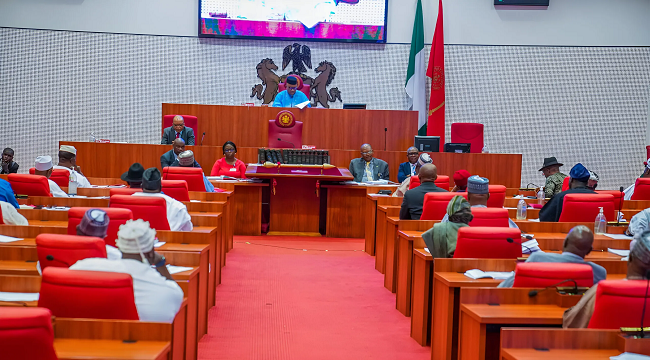The Senate has commended the Economic and Financial Crimes Commission (EFCC) for its outstanding performance in fighting economic and financial crimes, particularly the progress recorded in 2024.
This followed the adoption of a motion sponsored by Senator Emmanuel Udende (Benue North East), who hailed the EFCC’s professionalism, dedication and patriotism despite numerous operational challenges.
Presenting the motion yesterday, Senator Udende noted that the EFCC received 15,724 petitions in 2024, opened 12,928 case files, filed 5,008 cases in court, and secured a record 4,111 convictions — the highest in any single year since the commission’s establishment in 2003.
He added that the commission recovered substantial sums of money in local and foreign currencies, alongside various forfeited assets, contributing positively to Nigeria’s economic framework and international image.
“Despite limited resources, personnel constraints, and the increasing complexity of financial crimes, the EFCC has remained committed to its statutory mandate,” Udende said. “Its work inspires public confidence in the nation’s anti-corruption efforts and strengthens Nigeria’s reputation globally.”
The motion drew support from other lawmakers, including Senator Peter Onyekachi Nwebonyi (Ebonyi North), who seconded it and praised the commission’s transformation under the current administration.
“This is the first time the EFCC is living up to the expectations of Nigerians without relying on media trials,” Nwebonyi said. “They have recovered over ₦500 billion in 2024 alone. This is commendable.”
He also applauded President Bola Tinubu for appointing “the right people” to lead key anti-corruption institutions, calling the EFCC’s progress “a revolution.”
Senator Saliu Mustapha (Kwara Central) raised concerns over the EFCC’s retention of a statutory percentage of recovered funds, questioning whether proper legislative approval had been sought.
“The EFCC is entitled to a percentage of recoveries under the law, but has this chamber ever received any request or communication on this? We must improve oversight in this regard,” he said.
In response, Senate President Godswill Akpabio clarified that the law requires the President of Nigeria to seek Senate approval for any such retention — not the EFCC.
He instructed relevant committees to follow up on whether such requests had been made.





